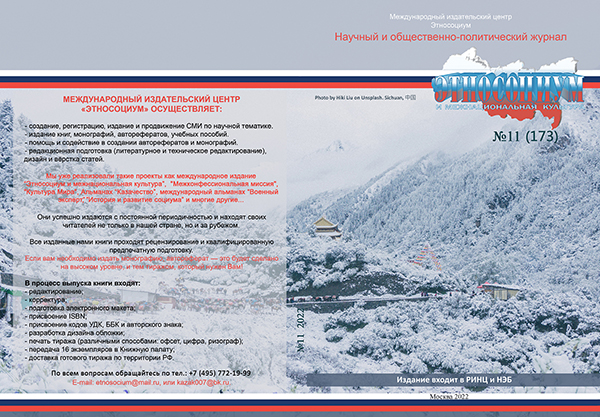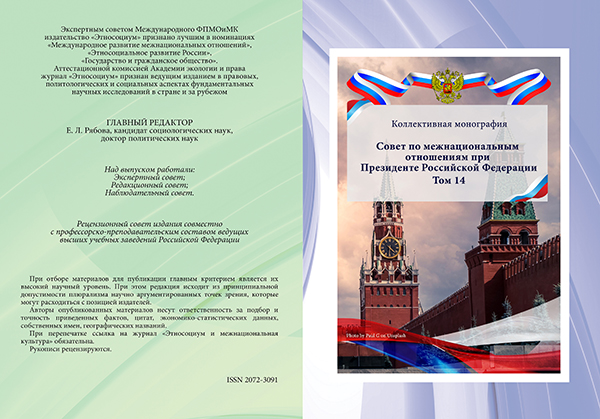

Content
|
COUNCIL OF INTERNATIONAL RELATIONSHIP
|
|
|
Zorin V.U., Kamenskikh M.S. The most important event of the outgoing year: the conference dedicated to the 10th anniversary of the Council under the President of the Russian Federation on interethnic relations
|
9
|
|
Vinokurov N.V. Social media in the processes of political socialization of youth
|
15
|
|
Mutalimov A.E. Russian patriotism is a strong interweaving of ethical and ethno–national values of its citizens
|
25
|
|
ECONOMY
|
|
|
Trofimova N.N. The relationship between the knowledge economy and the innovative development of the national economy
|
34
|
|
Trofimova N.N. Key Approaches to Talent Management in the Modern Conditions of General Globalization and Complication of Business Processes
|
40
|
|
ACTUAL PROBLEMS OF MODERN SOCIETY
|
|
|
Maslova G.O., Maslov S.A., Ponomarenko B.T. Features of professional burnout among medical personnel of medical organizations
|
48
|
|
Podolskiy V.A. Trust in institutions as a factor of political processes in new democracies on the example of Post-Soviet Russia
|
56
|
|
Demidova E.N. Some aspects of the ideology of modern Russia
|
63
|
|
REGIONAL STUDIES
|
|
|
Kosyreva M.S., Tabarekov D.M. Radicalism, extremism and terrorism in the reception of global media
|
70
|
|
INTERNATIONAL RELATIONSHIPS
|
|
|
Gu Li The dramatic linguistic character of Yulsky's novels
|
78
|
|
Tambi S.A. Euroscepticism in the mirror of the Estonian press
|
84
|
|
He Zhiyun Revisiting the educational model of Chinese teaching in the context of digitalization
|
114
|
|
DISCUSSION FORUM
|
|
|
Maltsev K.G., Alaverdyan A.L. «Ambiguous identities»: on the question of the interpretation of the «ambiguity» of the modern discourse of the nation
|
121
|
|
Abstracts
|
148
|
|
Authors
|
159
|
|
Requirements to materials submitted to the international publishing house "Etnosocium"
|
163
|
The All-Russian Scientific and Practical Conference "Russia: Unity and Diversity" was held in Moscow. The work of the section "Interaction between the state and society: civil society institutions, national and youth associations in the field of implementation of the state national policy" was organized on November 16 this year. in the Public Chamber of the Russian Federation.
Keywords: Moscow, conference, all-Russian, unity, diversity.
In the article, the author examines the features of the formation of the processes of political socialization of youth through social media. It is in the youth environment that social media are most popular and, therefore, are the main source of information. The development of information and communication technologies predetermined the development of social media, however, the political and legal regulation of such new channels of political socialization is significantly delayed, which leads to the possibility of their use in a destructive way. The author focuses on the difficulty in using exclusively restrictive tools for the use of social media by young people, while drawing attention to the need to regulate and manage this process.
Keywords: youth, political participation, political socialization, social media, social networks.
The purpose of the work. The article notes that patriotism and heroism of Russians are described and researched by historians and writers, sung by poets and composers at all times of the existence of the statehood of our country. Patriotism is love for the fatherland, devotion to it, the desire to serve its interests by their actions. Patriotism is one of the deepest feelings, fixed for centuries and millennia in the actions and deeds of people. It also forms the ideological views of the younger generation.
All normal people know about their consciousness and express it verbally. The author of the article also notes that consciousness and language are inextricably linked. It is enough to point out the fact that one of the conditions of possibility is his ability to speak about his consciousness and thereby declare his relative consciousness, directly related to his native langua.
Method or methodology of the work. The scientific work is based on a general scientific methodology, which provides for the application of a systematic approach to problem solving. The basis of this work is the fundamental works of domestic and foreign thinkers on the problems of the development and interweaving of ethical, ethno-national and personal values in a civil democratic society.
Results. In the new historical conditions, the patriotic education of the younger generation takes on new forms. Educating youth on objective historical data is of paramount importance for the future of the country, for the spiritual institutions of society when the functioning of civil society becomes an objective necessity.
The scope of the results. The results of the study can be used in the youth environment, in schools, higher educational institutions, among the army youth in the formation of their political consciousness, contributing to the management of society. A society develops safely if most of its citizens share common attitudes and values. In the current situation, patriotism can be distinguished as a basic value.
Keywords: patriotism, heroism, worldview, national idea, education, training, civil and patriotic consciousness, sense of homeland, value, debt, integrity, language, culture, personality, nation, aesthetic values of sport.
The object of the research is the concept of the knowledge economy. The subject of the research is the concepts of the knowledge economy proposed by reputable world and Russian scientists. The study of the knowledge economy in the world is closely connected with the formation of theories of the development of post-industrial society, when human capital and knowledge are the key factors.
Keywords: knowledge economy, innovation, innovative development, national economy.
Talent management issues are widely discussed by senior executives and HR managers in various fields around the world. Recently, in the context of the increasing complexity of the influence of environmental factors, increasing competition and globalization, there has been an ever-growing interest in this topic. The problem is that the concept of talent and talent management lacks theoretical soundness and a standardized definition. It is important to develop a common definition of talent and talent management for common understanding and practical application in personnel management. The purpose of this article is to analyze the key approaches to the concept of talent management in modern conditions.
Keywords: personnel management, talent management, management concept, control talents.
For modern medical organizations, maintaining efficiency and preventing professional burnout of doctors of various specialties is the leading social factor in their long-term and effective functioning. The World Health Organization (WHO) characterizes the process of professional burnout as a syndrome that develops as a result of chronic work stress, in which symptoms occur, including a "feeling of energy exhaustion", an increase in mental distance from work or a feeling of negativity and cynicism at work, as well as a decrease in work results.
Keywords: personnel, burnout, work, interests, professional, medicine, organization, structure.
The low trust was a feature of the new democracies at the end of the 20th century, which made reform difficult and exacerbated those factors that harmed trust. After the transition to democracy in many post-socialist states, trust in institutions has decreased due to the deteriorating economic environment, declining social support, increased crime, ethnic and political conflicts. The peculiarity of the influence of trust on political processes in new democracies was associated with the low efficiency of institutions and the predominance of particularised trust. In political processes in new democracies, trust played a greater role than in old democracies, and political conflicts were associated more with trust than with the discussion of the quantitative parameters of public administration decisions.
Keywords: trust, political institutions, political processes, history of Russia, democracy.
The article discusses a few historically prominent factors that influence an ideology of contemporary Russia. Relevance of the topic can be explained in the light of the shift that the societal system of values is undergoing today. This shift consists of transition to priority of spiritual values over materialistic ones, rising significance of the sense of duty and interest in patriotism. The author claims that those tendencies are deeply rooted in the foundation of Russian governance due to a number of peculiarities innate to its national, cultural, economic, political development. Struggles of transforming the social consciousness from the paradigm of personal success to the paradigm of collective prosperity, active involvement in it, according to the author, are caused by lack of a clear ideal of society as well as an ideal of citizen. Additionally, one is deprived of connection between the ideal and opportunities to incorporate this ideal for different social classes. Several components of this ideal were overshadowed and obscured, since the necessity of a thorough academic research which might allow a reconstruction and reconsideration of meaning behind historical processes in Russia.
Keywords: ideology, UniTy, patriotism, national idea, ideal.
The article analyzes the content and definitions of the concepts of "radicalism", "extremism" and "terrorism" in the modern global media space. The review of opinions and observations of experts in the field of political communication, traditional and new media, allows to form a coherent idea of the specifics of reception of the phenomena of radicalism, extremism and terrorism in the global media.
Keywords: political communication, global media, radicalization, extremism, terrorism.
Boris Yulsky was an outstanding Russian writer of the 20th century, especially short stories, known for their shortness and conciseness, novel subject matter, clever layout and exquisite style. Yulsky broke the inherent narrative mode in the creation of novels, introduced monologues, dialogues and other creative techniques in script creation, organically combined the monologues, dialogues and narratives in the novel, formed his own unique creative style, achieved a better artistic effect, and was of typical significance. This article takes Yulsky's short stories as an example to interpret the dramatic language characteristics of Yulsky's novels from the aspects of "dramatic description" and "dramatic dialogue", and shows readers the charm of Yulsky's short stories.
Keywords: Boris Yulsky, short story, dramatic depictions, dramatic dialogue.
The paper is devoted to the study of how Eurosceptic public sentiment within Estonia are interpreted in the press published in this state. Eurosceptic discourse in the articles of Estonian newspapers (by Estonian-speaking and Russian-speaking authors) has been identified and traced since 1995 and up to the present time. Examples of Eurooptimistic and Eurorealist counter-theses are also stated.
Keywords: euroscepticism, European Union, politics, Estonia, press, media.
Following the widespread introduction of information technology, digitalization is not only becoming our way of being, working and educational environment, but also significantly transforming the only traditional model of Chinese teaching. In this article, we make an attempt to analyse a new educational model of Chinese teaching, which is emerging in the context of digitalization, specify the current educational goals and needs of Chinese teaching, consider digital technologies for Chinese teaching and inclusion in the global educational space.
Keywords: digital technologies, Chinese teaching, educational model.
The structure of the discourse of «nation» and the principles of its organization in modern social science are revealed on the characteristic example of the sociological discourse of «nation" and "nationalism» by Wallerstein/Balibar. The essence of the «ambiguity» of «national identity» is established; the conditions for «attributing reality» to the «social category of the nation» are determined; the basis of the normativity of the discourse of the nation is revealed; the statement about the narrativity of the representation of the nation in modern social science is proved.
Keywords: nation, ethnicity, race, narrative, management paradigm, modernity.